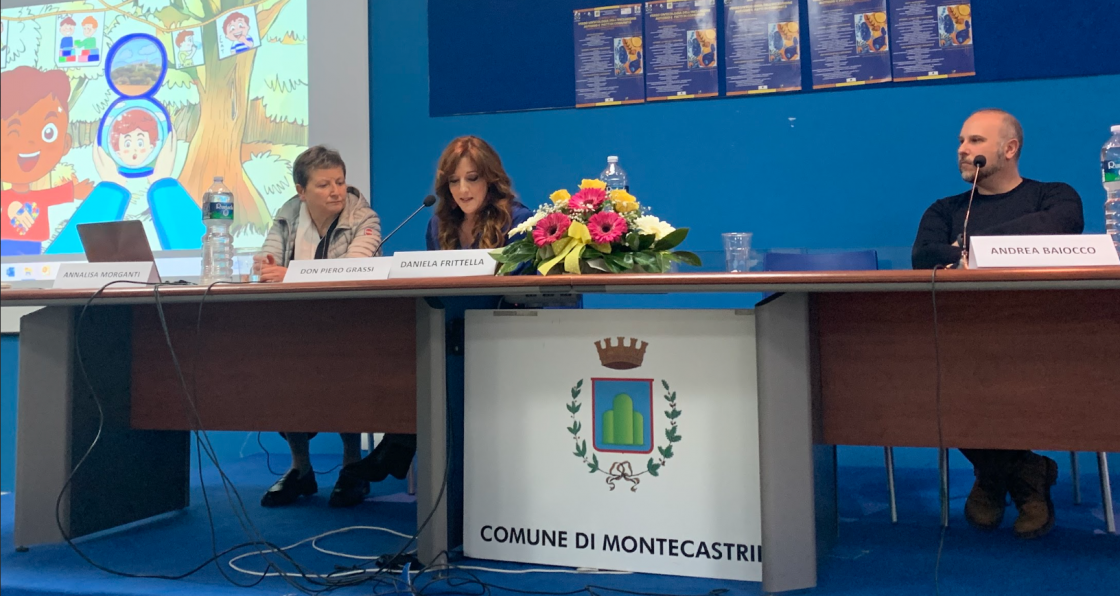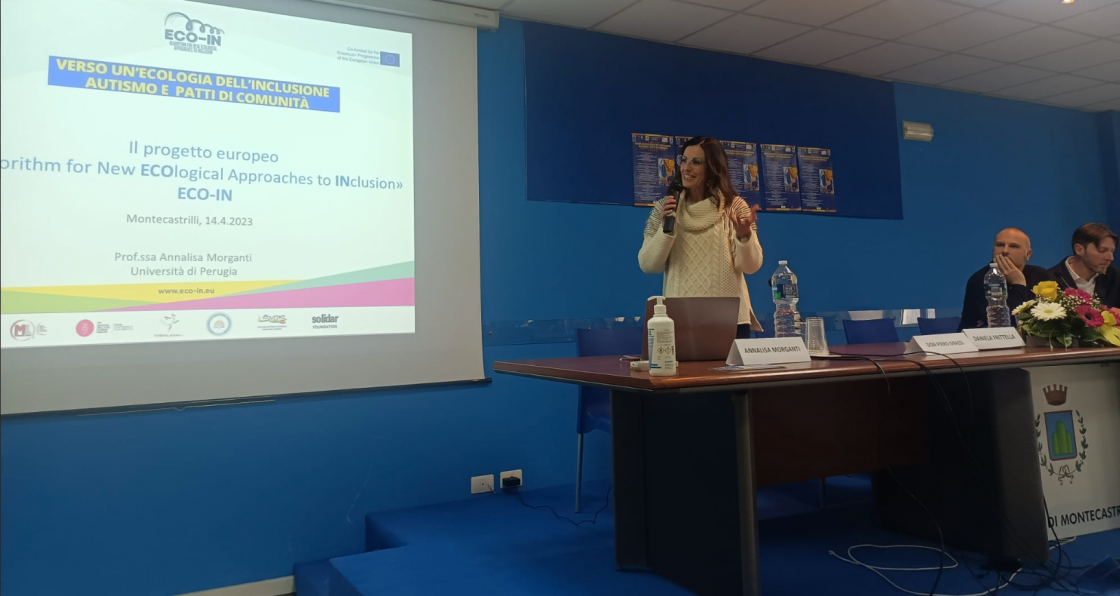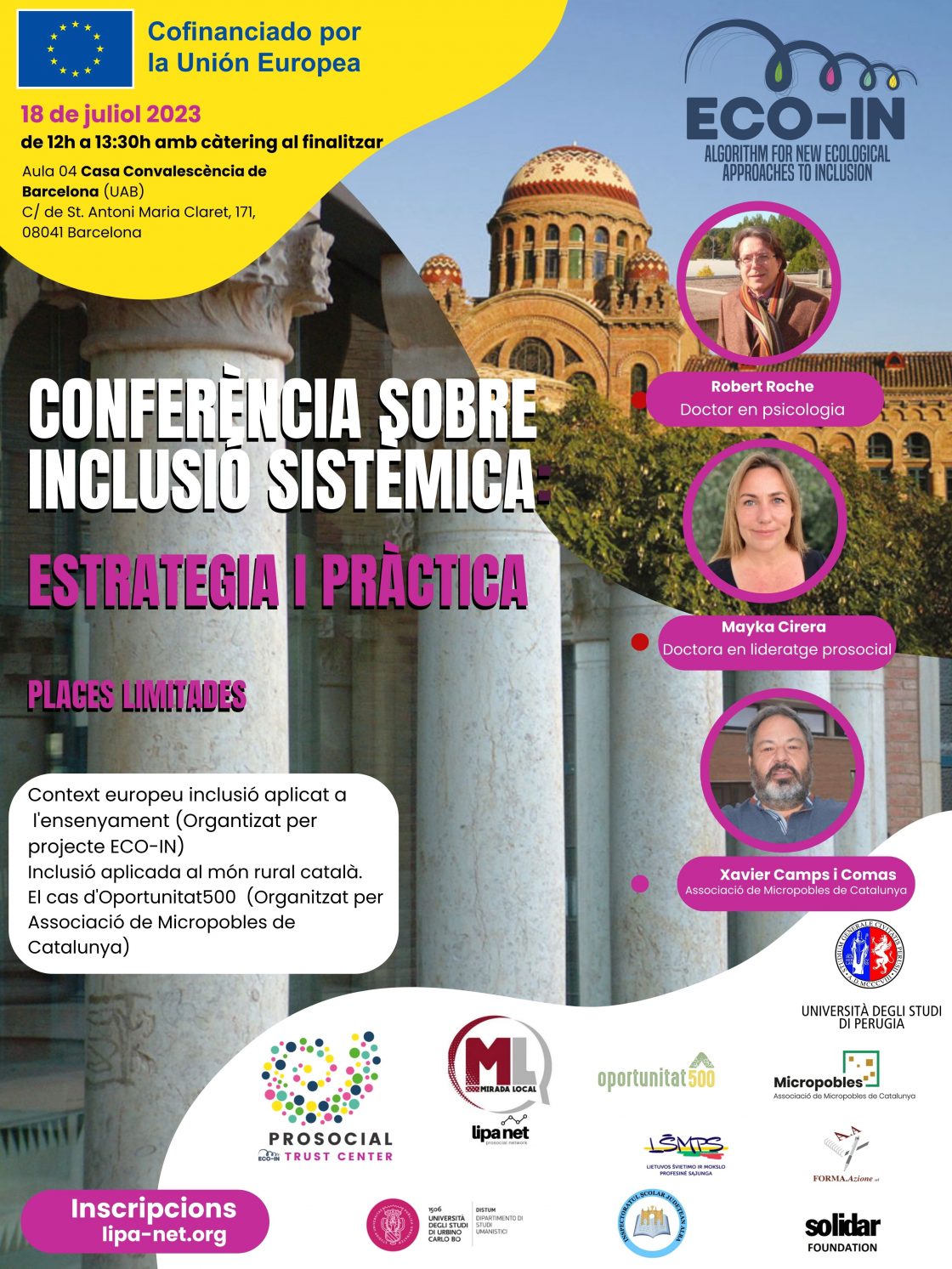Why involve politicians in school inclusion?

Inclusion is not just a school issue. A student or a family with special needs, the groups belonging to minorities, on the route they take to get to school travel through the territory.
A student, before reaching the classroom and meeting her teacher, crosses a street, uses means of transportation, buys in a store, and meets people. At school, before the classroom activities begin, each student talks with his classmates, observes, and is observed.
Inclusive culture must be a reality in all the spaces in which people operate.
Reducing inclusion in classroom life does not allow intervention in the system to eradicate all exclusions, be they structural, psychological, or physical.
In ECO-IN, a new algorithm is proposed so that the territories where the schools are inserted can improve the quality of their inclusion programs. Not only teachers are needed, but also the collaboration of teachers, families, local politicians, education technicians, researchers, specialists, NGOs and, of course, the students themselves, as protagonists and main actors in this process.
For this reason, in the project, we work together with town halls and schools and invest in quality spaces for the construction of centers of prosocial trust and thus ensure that innovation in inclusion is systemic and adapted to the specific reality of each territory.
Collaborative training schools – municipalities
On 13 April 2023, in Dovilai, Klaipėda district, the second training of the project “ECO-IN” – “Algorithm of new ecological approaches to inclusion” took place. During the training, the concept of ecological environmental systems that influence the development of a child was presented by the representative of Klaipėda District Municipality (Lithuania) Irena Barbšienė, special educators of Gargždai Minija Progymnasium Jūratė Klizaitė and Audronė Leketienė, social educators Guoda Donylė and Asta Bulvydienė, and speech and language therapists Virga Damulienė and Daiva Jankauskienė, who spoke and presented their daily challenges in the field of inclusive education. Finally, Aušra Jančiauskienė, a parent representative and mother of a child with special needs herself, shared her sensitive story.
The presentations emphasized inclusive education, teamwork, joint efforts, and equal commitment to all pupils and not only to children with special educational needs, which is of particular significance.
Based on the speakers’ contributions, it became clear that although quite a lot is being done in inclusive education in the Klaipėda district, politicians’ perception of the achievements in this field differs greatly from the actual situation. There is a severe lack of staff (sign language teachers, special educators, speech therapists, psychologists) for sensory rooms, and elevators for children with mobility disabilities. What is more, there is no plan in place for the continuity of the education of children with special needs after they leave school. The discussion also highlighted another sensitive issue: the lack of psychological support for the teachers themselves. Following the training, the participants visited Dovilai Primary School.
On April 14, 2023, the community of Montecastrilli (a town in Umbria, Italy) came together to discuss the ecological model of inclusive education promoted by the ECO-IN project, thanks to the initiative of the school principal, teachers, and families of the Petrucci Comprehensive Institute. The event was attended by Professor A. Morganti, coordinator of the project, school staff, and participating families. The large audience and active participation demonstrated the need and urgency to build networks in support of educational and social inclusion. This occasion not only allowed for the presentation of the ECO-IN project but also provided a firsthand view of the results that the project has produced in the area, starting with the school’s commitment to building the first Italian center of prosocial trust on their premises.
From the beginning of the project, the town hall of Lliçà de Vall in Spain took on the challenge of incorporating ECO-IN into its spaces for educational debate, linking it to Prosocial Trust Center. In these spaces: families, school directors, the mayor, and community representatives, generated spaces for significant dialogue to innovate in school inclusion. Likewise, the association of MICRO TOWNS of Catalonia, was interested in ECO-IN to generate synergies with its refugee integration program, which is why several representatives of municipalities interested in the project will participate in the final conference of the project (18.07.23) in Spain.
The ECO IN project, Microtowns and Opportunity 500
At the end of 2020, the first meetings were held between the ECOIN Project and the Micropobles Association, which had agreed to participate as an Entity associated with the ECO-IN project.
Throughout the year 2021 it was agreed that the European ECO IN project would come to contribute its methodology and results for the achievement of a large inclusion project that Micropobles was promoting before the government of the Generalitat of Catalonia.
The work meetings were held virtually and on a weekly basis throughout the year 2021.
Among them we highlight a face-to-face meeting in the town of Aguilar de Segarra with the participation of Mario Urrea – Mayor of Torrebesses (Segrià) and president of Micropobles; Xavi Camps, Vice President North-Eastern (Alt i Baix Empordà i Gironès) and Mayor of Palau de Sta. Eulàlia; Montse Isern, Councilor of Aguilar de Segarra and head of the education area;* and other colleagues from the Comissió Acció Social (Magali) and Aida from the Faculty of Education of the UAB.
Dr. Robert Roche, coordinator of the ECO-IN project in Catalonia and Spain and LIPA-NET delegate linked to the Universitat Autònoma de Barcelona has been presenting the theoretical body of applied prosociality as an innovative model of social inclusion, a topic that was received positively when considering the possible synergies of the European project with the current Opportunity 500 project for the integration of refugees.
In this line, it was assessed that the concept of ECO-IN’s Prosocial Trust Centers could provide the territory with an interesting structure and methodology to strengthen the integration of these refugees and offer the peoples spaces for international dissemination to promote their project. as an innovative experience in Catalonia.
Currently, Micropobles is already coordinating the Opportunity 500 pilot project, with excellent results. We reproduce a synthesis of it published in the newspaper EL PAIS.
About thirty refugee families and immigrants with papers have settled in towns with fewer than 500 Catalan inhabitants, attracted by the offer of employment and housing promoted by the Association of Microtowns of Catalonia and the Generalitat to fight against depopulation.
The proposal is part of the “Oportunitat 500” program, which began as a pilot test last September and is scheduled to end next October, the president of the Association of Microtowns and the mayor of Torrebesses (Lleida) told Efe. Mario Urrea. To carry it out, the program has the support of the Employment Service of Catalonia (SOC), the Department of Equality and Feminism and the Association of Rural Initiatives of Catalonia.
The SOC allocates more than 865,000 euros to the project and pays 19,434 euros gross per year for each worker. The town halls provide housing and the rest of the entities accompany the families to help their integration into the town. “The idea is that they end up adapting and living with us to help repopulate,” admits Mario Urrea.
In order to contribute to the accommodation of families in small towns, five technicians financed by the SOC are also in charge of accompanying and guiding the beneficiaries of the program. The majority of the families that have settled come from Ukraine, Syria, Venezuela, Afghanistan and Ecuador and total about 90 people, half of them adults and the other children.
A total of 25 towns participate in the programme: Almatret, Llardecans, Torrebesses, Torre-serona, Aspa, Baix Pallars, Farrera, Tírvia, Talarn, Conca de Dalt, Bellaguarda, the Sentiu de Sió and Ciutadilla (Lleida), Senan, Vilanova de Prades, les Piles, Blancafort, els Garidells, the Torre de Fontaubella, Ulldemolins and Freginals (Tarragona), Ordis (Girona) and Veciana, Pujalt and Vilada (Barcelona).
The president of Micropobles has been satisfied with the result that the initiative is having and has stressed that the stay in the town of the families “is very enriching.” When the pilot test ends, explains Urrea, the intention is to extend the program to municipalities with less than 1,000 inhabitants to more easily find available housing. One of the reasons for extending the program to larger locations is its “greater possibilities”.



